
10 Best Audiobooks to Learn English
If it’s hard for you to find time to read books in English, audiobooks can help.
And if you do read sometimes, you can use audiobooks to listen to the sentences spoken aloud while you read.
This can help you with your English pronunciation—and your listening!
This guide will show you 10 outstanding audiobooks that’ll improve your English skills and help you get better at having conversations in English.
Contents
- Learner-Friendly English Audiobooks
- English Audiobooks Based on Novels
- Benefits of Using Audiobooks to Learn English
- Choosing the Best Audiobooks for You
- Where to Find Audiobooks
- Tips for Actively Listening to English Audiobooks
Download: This blog post is available as a convenient and portable PDF that you can take anywhere. Click here to get a copy. (Download)
Learner-Friendly English Audiobooks
1. “Short Stories in English” by Olly Richards
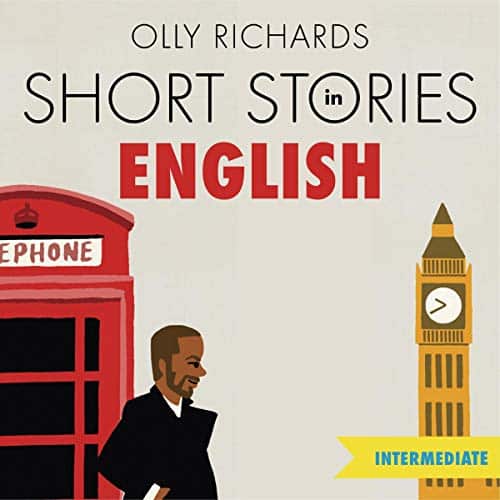
If listening to a novel-length audiobook seems intimidating, you can practice first with this compilation of short stories.
It’s actually an entire series that covers all levels: beginner, intermediate and advanced.
The conversations are authentic and engaging, and each story comes with a vocabulary list, summary, and quiz so you’re also doing active learning.
2. “English Grammar Rules You Must Know” by Lessie Bradach
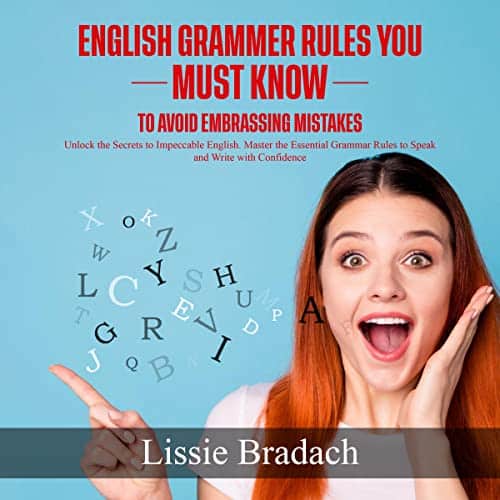
This audiobook on grammar takes on complicated topics and breaks them down with easy-to-understand explanations.
It covers forms of speech, pronouns, tenses and other grammar fundamentals, along with common mistakes, which I found very helpful.
While the language is simple, even native speakers actually download it to improve their writing.
3. “500 Really Useful English Phrases” by Jenny Smith
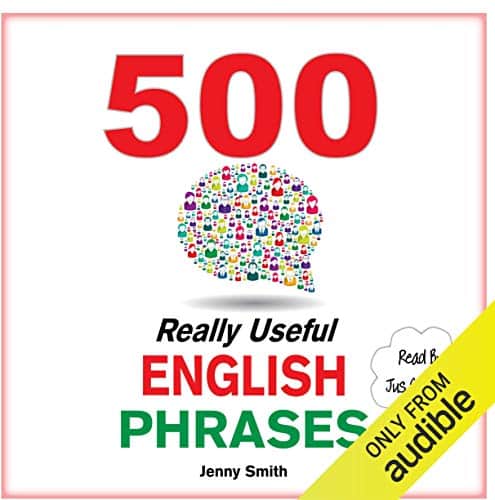
When you’re already at an intermediate level or above, what you need is more exposure to how native speakers really use English. This audiobook gives you that, focusing on phrases that often pop up in real life.
It’s easier to remember the phrases too because they’re introduced through articles and stories, with additional example sentences.
4. “101 Conversations in Simple English” by Olly Richards
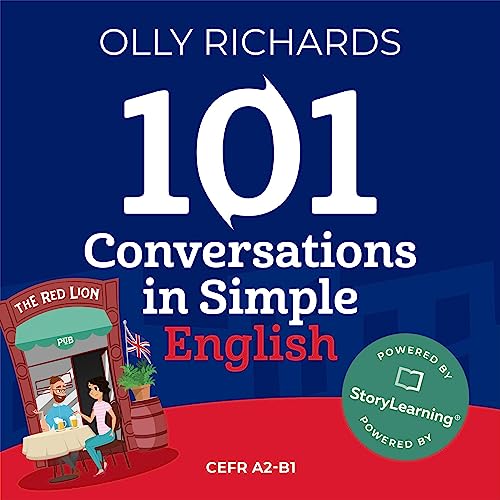
Here’s another audiobook by Ollie Richards, who’s known for teaching languages through stories!
I’d recommend this for learners looking to get better at conversational English.
It’s about two friends who explore London, so you’ll pick up vocabulary for common situations like shopping and asking for directions. With more than 15,000 vocabulary words, it’s meant for A2 to B1 learners.
5. “English Pronunciation Secrets” by Rebecca Bower
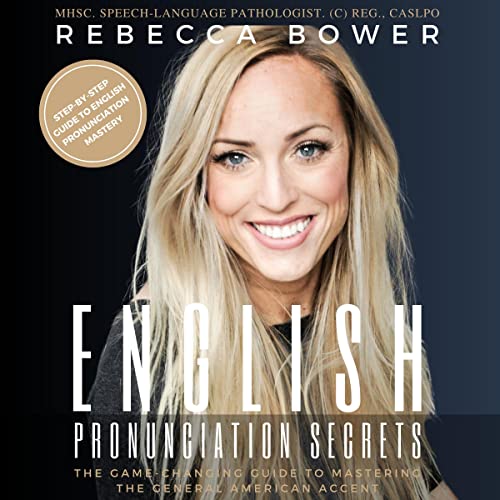
No matter what your English level, you might still want to work on certain areas of your pronunciation! This audiobook is helpful for getting an accent that’s closer to standard American English.
It even explains mouth positions so you can get basic sounds right, followed by exercises where you read phrases and sentences.
English Audiobooks Based on Novels
6. “The Alchemist” by Paulo Coelho

“The Alchemist” is a classic tale that’s about following your dreams and paying attention to what you really want.
Santiago, a shepherd boy, travels far away in search of a treasure. He soon discovers, though, that the real treasure isn’t really what he imagined.
It’s great for intermediate learners because it uses straightforward vocabulary and short sentences.
7. “Oh the Places You’ll Go” by Dr. Seuss

Dr. Seuss might be a children’s book writer, but this book has been read to high school and college students at graduation many times!
It’s a simple book for beginners that’s loved by everyone.
8. “Because of Winn-Dixie” by Kate DiCamillo

This book tells the story of Opal as she moves to a new city. Opal learns how to get over her fear and loneliness thanks to a dog named Winn-Dixie.
This is a heart-warming story for young adults, and is perfect for intermediate English learners.
9. “The Picture of Dorian Gray” by Oscar Wilde

What would you do if you could stay young forever? The story of Dorian Gray tells what happens when a picture of you grows old instead of you.
The dramatic reading of this book has a different person reading the different parts, which makes it an excellent audiobook to practice English listening and understanding different voices and accents.
10. “The Hitchhikers’s Guide to the Galaxy” by Douglas Adams
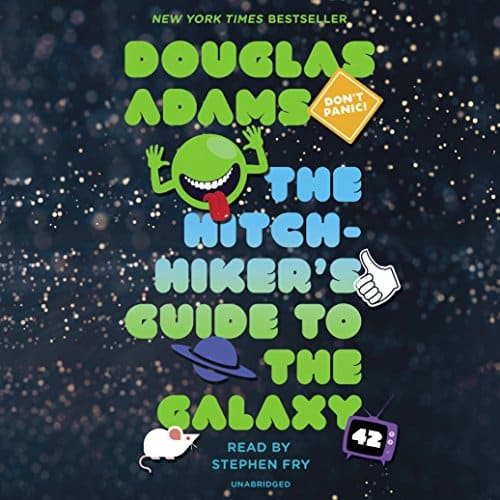
Even if you aren’t a fan of science fiction, you will love the crazy adventures of Arthur Dent, a man who goes hitchhiking (getting rides from strangers) through outer space.
Narrated perfectly by UK star and comedian Stephen Fry, this book is very funny, but may be difficult to understand. It’s well worth a try if you want a challenge!
Aside from these audiobooks, you can also tune into podcasts for more English listening practice:
English Podcasts for Learners [2024 Edition] | FluentU English
Listening to English podcasts can be a great way to improve your comprehension skills. Read this guide to find out about 22 English podcasts that are definitely worth your…
Benefits of Using Audiobooks to Learn English
Why would you want to practice using audiobooks?
There are many reasons:
- You can repeat any part of the book as many times as you want. You might be afraid or embarrassed to ask people to repeat themselves, but you can repeat an audiobook over and over (and it will never get annoyed).
- You can “read” the book as slow or fast as you want. Listen to only one paragraph a day, or read an entire book in a few hours. When you’re talking with a real person, you can’t really tell them to share only half of their story today and the rest tomorrow—but you can stop an audiobook wherever you want to.
- You can choose any accent, gender or speed that you want to listen to. Do you have trouble understanding people with British accents? You can listen to an audiobook read by a British person to practice. Want to understand New Yorkers better before moving there? You can find that, too. Audiobooks have so many different kinds of voices to choose from.
- You can listen to audiobooks any time. You can listen on your way to work or school, during breaks or even right before bed. It’s like having somebody read you a bedtime story!
Choosing the Best Audiobooks for You

Aside from the audiobooks listed above, there are many audiobooks to choose from, on every topic you can imagine. You can listen to someone talk about dinosaurs, airports or 16th century Italy—whatever you’re interested in, there’s an audiobook for that.
When you’re choosing an audiobook, look for something you would enjoy reading. If you already own the book or e-book version of the audio, that’s even better because you can read along if just listening is too difficult.
To find your reading level, try listening to adult fiction. If it’s too hard to understand, read young adult fiction instead. Still can’t follow along? Try a children’s book. Children’s audiobooks are wonderful learning tools because they are meant to be understood by listeners who might not know all the words.
Of course, English learning books are also a classic choice, especially if you want to improve on a certain aspect, like grammar or vocabulary.
Where to Find Audiobooks
You can find audiobooks all over the internet, some even for free. Here are just a few places to start with:
- Audible — This is one of the largest audiobook websites. It’s owned by Amazon, and has over 200,000 books for you to listen to. It’s not free, but it does have a free 30-day free trial, and if you discover that you love audiobooks, it might be worth getting a subscription.
- Libro.fm — This website works similarly to Audible: For a monthly fee, you get a credit that you can spend on any audiobook in their extensive catalogue. Libro.fm partners with local bookstores, so your money is benefiting the authors as well as bookstores.
- Barnes and Noble — The giant bookstore chain has its own subscription service, offering a free trial as well as frequent sales. You’ll need to have the Nook app to play these audiobooks, so this is a good option if you already use the service or app.
- Audiobooks — This has over 450,000 titles to choose from, and has a generous free trial. A subscription also comes with access to features like more than 10,000 free audiobook listens, the ability to add family members, a community of enthusiastic book lovers and more.
- Rakuten Kobo — Kobo is another audiobook and e-book marketplace that’s a slightly cheaper option if you only listen to audiobooks infrequently.
- Spotify — That’s right: Your favorite music and podcast streaming program now has over 200,000 audiobooks. There’s no monthly subscription: You just buy the book you want to listen to.
- Apple Books and Android Play Store — You can buy audiobooks right on your iOS or Android phone. On Android devices, books are available to buy and listen to in your favorite audiobook app, while all audiobooks on iOS can be purchased through the Apple Books app.
- Project Gutenberg — If you’d rather not pay for audiobooks yet, you can look around Project Gutenberg. This website is known for its collection of free e-books, but it also has a nice selection of audiobooks.
- Librivox — This website of free audiobooks exists thanks to volunteers from around the world who read books aloud for the site. It has some great books to choose from.
- Libby — Libby is a library app that lets you check out digital books and audiobooks from your local library. You’ll need a library card… and that’s it! The app and all audiobooks are free and easy to use, though more popular titles will often have a waitlist.
- Hoopla — Hoopla is a program similar to Libby, allowing you to access e-books and audiobooks with just your library card. It’s a good choice for you if you also want to check out free TV shows, movies and music, which are available on Hoopla but not Libby. Note that not as many libraries are available on Hoopla as Libby!
Tips for Actively Listening to English Audiobooks
If you just listen to audiobooks, you will learn something. But to really learn the most that you can, try using these tips:
- Take notes. Write down only things that will help you later when you look at your notes–for example, words and expressions that you don’t know.
- Read along. If you own a copy of the book you are listening to, read along with the audio. To practice pronunciation, stop the recording once in a while and read what you just heard out loud.
- Talk to other people about it. Consider joining online communities where you can talk about your books, like Goodreads or Online Book Club. You can also join a local book club using Reader’s Circle or Meetup to find a book club near you.
- Listen again. After you listen once, put the audiobook away and look up the words you didn’t know. Then listen more closely to things you didn’t notice the first time, like how to use a word in a sentence or how the reader’s voice sounds when they use a phrase.
- Use what you learn. Use your new vocabulary words in conversations. You’ll be surprised at how much you learned from just listening to someone read a book to you!
Wherever you find English audio resources, the key to improving your skills is to use different methods and keep practicing.
If you enjoy learning with audiobooks, you might also like learning with audio/video content like movies and TV shows, which let you see how English is used in context as well as hearing it.
You can practice English listening with captioned video clips as well. Some language learning programs use videos to give you practice hearing and recognizing words in context.
It uses a natural approach that helps you ease into the English language and culture over time. You’ll learn English as it’s spoken in real life.
FluentU has a variety of engaging content from popular talk shows, nature documentaries and funny commercials, as you can see here:

FluentU makes it really easy to watch English videos. There are captions that are interactive. That means you can tap on any word to see an image, definition and useful examples.

For example, when you tap on the word "searching," you'll see this:

Learn all the vocabulary in any video with quizzes. Swipe left or right to see more examples for the word you’re learning.

The best part is that FluentU keeps track of the vocabulary that you’re learning and gives you extra practice with difficult words. It even reminds you when it’s time to review! Every learner has a truly personalized experience, even if they’re learning with the same video.
Start using the FluentU website on your computer or tablet or, better yet, download the FluentU app from the iTunes or Google Play store. Click here to take advantage of our current sale! (Expires at the end of this month.)

Enjoy listening and learning!
Download: This blog post is available as a convenient and portable PDF that you can take anywhere. Click here to get a copy. (Download)








